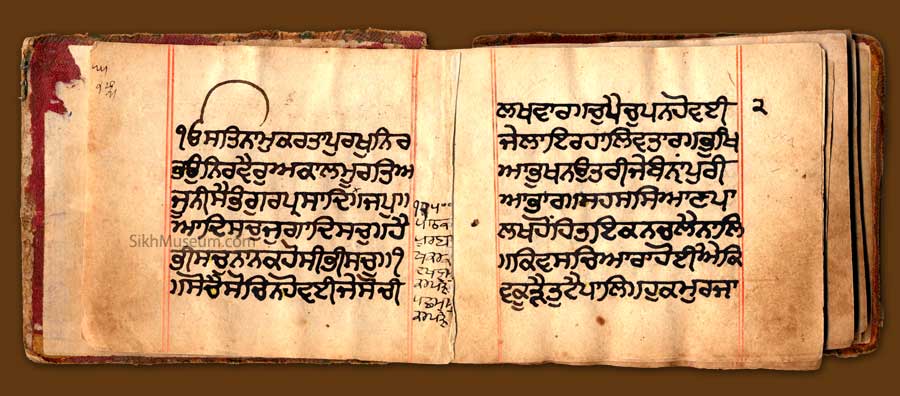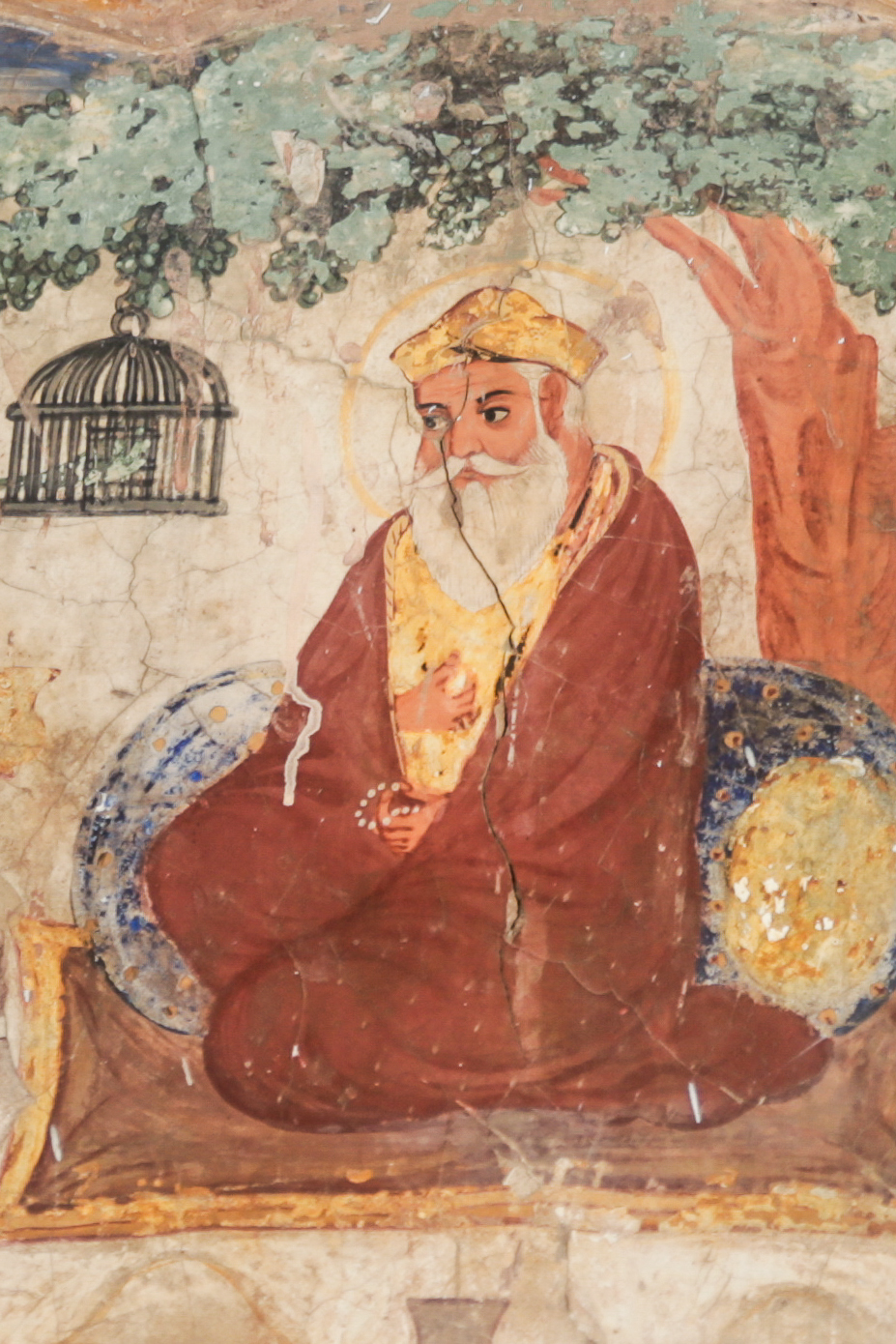|
Akal Ustat
Akal Ustat (Gurmukhi: ਅਕਾਲ ਉਸਤਤਿ) is the name given to the second Bani in the second holy scriptures of the Sikhs called the Dasam Granth. It is composed of 271 verses, and is largely devotional in nature. The word "Akal" mean the "timeless primal being" and the word "Ustat" (from the Sanskrit word 'stuti') means "praise". So together, the words "Akal Ustat" mean "the praise of the Timeless One". In it, Guru Gobind Singh, the tenth Sikh Guru writes that God is worshipped by various peoples in many different ways, and with varying names and methods: The scripture is notable for its unalloyed disavowal of the caste system Caste is a form of social stratification characterised by endogamy, hereditary transmission of a style of life which often includes an occupation, ritual status in a hierarchy, and customary social interaction and exclusion based on cultural ..., and of cultural elitism in general. At various points in this composition, Guru Gobind Sing ... [...More Info...] [...Related Items...] OR: [Wikipedia] [Google] [Baidu] |
Gurbani
Gurbani ( pa, ਗੁਰਬਾਣੀ) is a Sikh term, very commonly used by Sikhs to refer to various compositions by the Sikh Gurus and other writers of Guru Granth Sahib. In general, hymns in the central text of the Sikhs, the Guru Granth Sahib, are called ''Gurbani''. Among Amritdhari Sikhs, a few texts from Dasam Granth which are read as Nitnem, like ''Tav-Prasad Savaiye'' and ''Chaupai'', are also considered ''Gurbani''. In Adi Granth, Gurbani is a sound which comes directly from the Supreme and the text is a written form of the same in worldly language and scripts. It is also called ''Guru´s Bani''. Gurbani are explanations of qualities of the Primal Lord and Soul which a Sikh should comprehend and with which they can attain the supreme state. Sikh historical writings, unauthentic writings or apocryphal compositions written under the names of Sikh Gurus and other writings by Sikhs are not considered Gurbani and are referred to as ''Kachi Bani'' (ਕੱਚੀ ਬਾਣ� ... [...More Info...] [...Related Items...] OR: [Wikipedia] [Google] [Baidu] |
Sikh
Sikhs ( or ; pa, ਸਿੱਖ, ' ) are people who adhere to Sikhism (Sikhi), a monotheistic religion that originated in the late 15th century in the Punjab region of the Indian subcontinent, based on the revelation of Guru Nanak. The term ''Sikh'' has its origin in the word ' (), meaning 'disciple' or 'student'. Male Sikhs generally have ''Singh'' ('lion'/'tiger') as their last name, though not all Singhs are necessarily Sikhs; likewise, female Sikhs have ''Kaur'' ('princess') as their last name. These unique last names were given by the Gurus to allow Sikhs to stand out and also as an act of defiance to India's caste system, which the Gurus were always against. Sikhs strongly believe in the idea of "Sarbat Da Bhala" - "Welfare of all" and are often seen on the frontline to provide humanitarian aid across the world. Sikhs who have undergone the '' Amrit Sanchar'' ('baptism by Khanda'), an initiation ceremony, are from the day of their initiation known as Khalsa, and they mu ... [...More Info...] [...Related Items...] OR: [Wikipedia] [Google] [Baidu] |
Dasam Granth
The ''Dasam Granth'' (Gurmukhi: ਦਸਮ ਗ੍ਰੰਥ ''dasama gratha'') is a collection of various manuscripts in Sikhism containing compositions attributed to Guru Gobind Singh.Dasam Granth Encyclopædia Britannica, pages 2, 67 Guru Gobind Singh ordained the sacred text as his successor, eternally ending the line of human Gurus. It is the primary holy scripture of the Sikhs and regarded by Sikhs as the living embodiment of Ten Gurus. is a part of ("Dasam Granth") compos ... [...More Info...] [...Related Items...] OR: [Wikipedia] [Google] [Baidu] |
Guru Gobind Singh
Guru Gobind Singh (; 22 December 1666 – 7 October 1708), born Gobind Das or Gobind Rai the tenth Sikh Guru, a spiritual master, warrior, poet and philosopher. When his father, Guru Tegh Bahadur, was executed by Aurangzeb, Guru Gobind Singh was formally installed as the leader of the Sikhs at the age of nine, becoming the tenth and final human Sikh Guru. His four biological sons died during his lifetime – two in battle, two executed by the Mughal governor Wazir Khan.; Among his notable contributions to Sikhism are founding the '' Sikh'' warrior community called '' Khalsa'' in 1699 and introducing '' the Five Ks'', the five articles of faith that Khalsa Sikhs wear at all times. Guru Gobind Singh is credited with the '' Dasam Granth'' whose hymns are a sacred part of Sikh prayers and Khalsa rituals. He is also credited as the one who finalized and enshrined the '' Guru Granth Sahib'' as Sikhism's primary scripture and eternal Guru. Family and early life Gobind Sing ... [...More Info...] [...Related Items...] OR: [Wikipedia] [Google] [Baidu] |
Sikh Guru
The Sikh gurus (Punjabi: ਸਿੱਖ ਗੁਰੂ) are the spiritual masters of Sikhism, who established this religion over the course of about two and a half centuries, beginning in 1469. The year 1469 marks the birth of Guru Nanak, the founder of Sikhism. He was succeeded by nine other human gurus until, in 1708, the '' Guruship'' was finally passed on by the tenth guru to the holy Sikh scripture, Guru Granth Sahib, which is now considered the living Guru by the followers of the Sikh faith. Etymology and definition ''Guru'' (, ; sa, गुरु, Punjabi: ਗੁਰੂ, IAST: ''guru'') is a Sanskrit term for a "teacher, guide, expert, or master" of certain knowledge or field. Bhai Vir Singh, in his dictionary of Guru Granth Sahib describes the term Guru as a combination of two separate units: "Gu;(ਗੁ)" meaning darkness and "Rū;(ਰੂ)" which means light. Hence, Guru is who brings light into darkness or in other words, the one who enlightens. Bhai Vir Singh's defi ... [...More Info...] [...Related Items...] OR: [Wikipedia] [Google] [Baidu] |
Caste System
Caste is a form of social stratification characterised by endogamy, hereditary transmission of a style of life which often includes an occupation, ritual status in a hierarchy, and customary social interaction and exclusion based on cultural notions of purity and pollution. * Quote: "caste ort., casta=basket ranked groups based on heredity within rigid systems of social stratification, especially those that constitute Hindu India. Some scholars, in fact, deny that true caste systems are found outside India. The caste is a closed group whose members are severely restricted in their choice of occupation and degree of social participation. Marriage outside the caste is prohibited. Social status is determined by the caste of one's birth and may only rarely be transcended." * Quote: "caste, any of the ranked, hereditary, endogamous social groups, often linked with occupation, that together constitute traditional societies in South Asia, particularly among Hindus in India. Although ... [...More Info...] [...Related Items...] OR: [Wikipedia] [Google] [Baidu] |
Sikh Scripture
The principal Sikh scripture is the Adi Granth (First Scripture), more commonly called the Guru Granth Sahib. The second most important scripture of the Sikhs is the Dasam Granth. Both of these consist of text which was written or authorised by the Sikh Gurus. Within Sikhism the Guru Granth Sahib or Adi Sri Granth Sahib is more than just a scripture. Sikhs consider this Granth (''holy book'') to be a living Guru. The holy text spans 1430 pages and contains the actual words spoken by the founders of the Sikh religion (the Ten Gurus of Sikhism) and the words of various other Saints from other religions including Hinduism and Islam. ''Shaant Ras'' (Essence of Peace) Guru Granth Sahib The principal Sikh scripture is the ''Adi Granth'' (First Scripture), more commonly called the ''Guru Granth Sahib''. The Sikhs do not regard this as their "holy book" but as their perpetual and current "guru", guide or master. It was called ''Adi Granth'' until Guru Gobind Singh, the tenth and fina ... [...More Info...] [...Related Items...] OR: [Wikipedia] [Google] [Baidu] |


.jpg)


